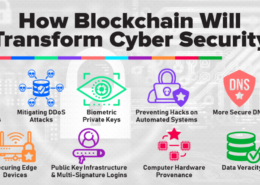Cybersecurity is essential for any country’s integrity, as its backbone connects with various aspects of daily life and national well-being. Nowadays we see the many threats against any country is common among the population, sometimes they can hack the personal ...
Blockchain technology's decentralized nature is revolutionizing cybersecurity in several key ways: 1. Distributed Ledger: Blockchain operates as a distributed ledger, meaning that data is stored across a network of computers (nodes) rather than a single central server. This makes it much moreRead more
Blockchain technology’s decentralized nature is revolutionizing cybersecurity in several key ways:
1. Distributed Ledger: Blockchain operates as a distributed ledger, meaning that data is stored across a network of computers (nodes) rather than a single central server. This makes it much more difficult for hackers to attack because there is no single point of failure. Compromising the network would require simultaneously attacking a majority of the nodes.
2. Immutability: Once data is recorded on a blockchain, it is extremely difficult to alter. This immutability helps prevent unauthorized changes and tampering. Each block is cryptographically linked to the previous one, creating a secure chain of information.
3. Transparency and Traceability: Transactions on a blockchain are transparent and can be traced back to their origin. This transparency deters fraudulent activities and enhances trust, as all participants can see the same information and verify it independently.
4. Decentralized Consensus: Blockchain uses consensus mechanisms (such as Proof of Work or Proof of Stake) to validate transactions. This means that no single entity controls the verification process, reducing the risk of corruption or manipulation.
5. Enhanced Security Protocols: Blockchain technology employs advanced cryptographic techniques to secure data. Public and private keys, along with digital signatures, ensure that only authorized users can access and execute transactions.
6. Smart Contracts: These are self-executing contracts with the terms directly written into code. They automatically enforce and execute agreements when predetermined conditions are met, reducing the need for intermediaries and enhancing security through automation.
By decentralizing data storage and verification, blockchain technology significantly enhances cybersecurity, making systems more resilient to attacks, reducing fraud, and increasing trust among users.
See less

Cybersecurity is crucial for a country's integrity because it protects the nation’s digital infrastructure, economic stability, and national security. In the modern digital era, countries are increasingly dependent on information and communication technologies (ICT), making them vulnerable to cyberRead more
Cybersecurity is crucial for a country’s integrity because it protects the nation’s digital infrastructure, economic stability, and national security. In the modern digital era, countries are increasingly dependent on information and communication technologies (ICT), making them vulnerable to cyber threats. These threats can range from hacking and data breaches to sophisticated cyberattacks that can cripple critical infrastructure. Here’s why cybersecurity is vital for maintaining a country’s integrity:
1. Protection of Critical Infrastructure:
Critical infrastructure includes sectors like energy, transportation, healthcare, and finance, which are essential for the functioning of a country. Cyberattacks on these sectors can have catastrophic consequences, disrupting services and causing widespread chaos. For instance, a cyberattack on the power grid can lead to blackouts, affecting millions of people and critical services like hospitals. Protecting these infrastructures from cyber threats ensures the safety and well-being of citizens.
2. Economic Stability:
Cybersecurity plays a significant role in maintaining economic stability. The digital economy relies heavily on secure transactions and the protection of intellectual property. Cyberattacks can lead to financial losses, undermine consumer trust, and disrupt business operations. For example, a major data breach in a financial institution can result in the loss of sensitive customer information, leading to financial fraud and erosion of trust in the banking system. By ensuring robust cybersecurity measures, countries can protect businesses from cyber threats and foster a secure economic environment.
3. National Security:
Cybersecurity is integral to national security. State-sponsored cyberattacks can target government networks, military systems, and intelligence agencies, compromising sensitive information and national defense capabilities. Cyber espionage and attacks on defense infrastructure can weaken a country’s military readiness and strategic advantage. By investing in cybersecurity, countries can safeguard their national security interests and protect themselves from potential adversaries.
4. Protection of Personal Data:
With the increasing digitization of personal information, protecting citizens’ data is essential for maintaining trust in government and public institutions. Cyberattacks that result in data breaches can lead to identity theft, financial fraud, and invasion of privacy. Effective cybersecurity measures ensure that personal data is protected, maintaining public confidence in digital services and e-government initiatives.
5. Prevention of Cybercrime:
Cybercrime, including phishing, ransomware, and online fraud, poses a significant threat to individuals and businesses. Cybersecurity helps in detecting, preventing, and responding to cybercrime, protecting citizens and organizations from financial and reputational damage. By strengthening cybersecurity, countries can combat cybercrime more effectively and uphold the rule of law in the digital realm.
6. International Relations and Trust:
Cybersecurity is vital for maintaining trust and cooperation in international relations. Countries are increasingly working together to address global cyber threats, and a robust cybersecurity framework helps build confidence among nations. Ensuring cybersecurity fosters trust in international partnerships, trade agreements, and diplomatic relations, contributing to global stability and peace.
7. Innovation and Technological Advancement:
A secure digital environment promotes innovation and technological advancement. Companies and researchers are more likely to invest in developing new technologies if they are confident that their intellectual property is protected. Cybersecurity encourages a culture of innovation by safeguarding the fruits of research and development from cyber threats
See less